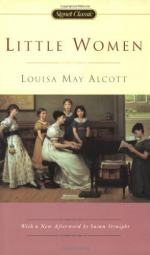These attributes, in spite of poverty and the strict integrity which shut him out from the more worldly successes, attracted to him many admirable persons, as naturally as sweet herbs draw bees, and as naturally he gave them the honey into which fifty years of hard experience had distilled no bitter drop. Earnest young men found the gray-headed scholar as young at heart as they; thoughtful or troubled women instinctively brought their doubts to him, sure of finding the gentlest sympathy, the wisest counsel. Sinners told their sins to the pure-hearted old man and were both rebuked and saved. Gifted men found a companion in him. Ambitious men caught glimpses of nobler ambitions than their own, and even worldlings confessed that his beliefs were beautiful and true, although ’they wouldn’t pay’.
To outsiders the five energetic women seemed to rule the house, and so they did in many things, but the quiet scholar, sitting among his books, was still the head of the family, the household conscience, anchor, and comforter, for to him the busy, anxious women always turned in troublous times, finding him, in the truest sense of those sacred words, husband and father.
The girls gave their hearts into their mother’s keeping, their souls into their father’s, and to both parents, who lived and labored so faithfully for them, they gave a love that grew with their growth and bound them tenderly together by the sweetest tie which blesses life and outlives death.
Mrs. March is as brisk and cheery, though rather grayer, than when we saw her last, and just now so absorbed in Meg’s affairs that the hospitals and homes still full of wounded ‘boys’ and soldiers’ widows, decidedly miss the motherly missionary’s visits.
John Brooke did his duty manfully for a year, got wounded, was sent home, and not allowed to return. He received no stars or bars, but he deserved them, for he cheerfully risked all he had, and life and love are very precious when both are in full bloom. Perfectly resigned to his discharge, he devoted himself to getting well, preparing for business, and earning a home for Meg. With the good sense and sturdy independence that characterized him, he refused Mr. Laurence’s more generous offers, and accepted the place of bookkeeper, feeling better satisfied to begin with an honestly earned salary than by running any risks with borrowed money.
Meg had spent the time in working as well as waiting, growing womanly in character, wise in housewifely arts, and prettier than ever, for love is a great beautifier. She had her girlish ambitions and hopes, and felt some disappointment at the humble way in which the new life must begin. Ned Moffat had just married Sallie Gardiner, and Meg couldn’t help contrasting their fine house and carriage, many gifts, and splendid outfit with her own, and secretly wishing she could have the same. But somehow envy and discontent soon vanished when she thought of all the patient love and labor John had put into the little home awaiting her, and when they sat together in the twilight, talking over their small plans, the future always grew so beautiful and bright that she forgot Sallie’s splendor and felt herself the richest, happiest girl in Christendom.




